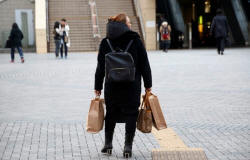Japan's retailers struggle to raise prices, even as
economy gains momentum
 Send a link to a friend
Send a link to a friend
 [January 12, 2018]
By Sam Nussey and Stanley White [January 12, 2018]
By Sam Nussey and Stanley White
TOKYO (Reuters) - Japan's economy is
gathering steam, profits are at record levels and companies are poised
to raise wages — yet retailers and restaurant chains are struggling to
lift prices for fear of losing customers conditioned by nearly two
decades of deflation.
This predicament could undermine the sustainability of Japan's recovery
and highlights just how difficult it will be for the central bank to
even get close to its 2 percent inflation target any time soon. Many
retailers see lower prices as essential to appealing to Japan's thrifty
consumers. The nation's biggest retailer Aeon Co. <8267.T> said its
price cuts on own-brand groceries actually boosted third-quarter profits
and on Friday announced that it would follow up discounting prices on
100 more everyday items from bread to dishwashing detergent by an
average of 10 percent.

"Our rivals are checking competitors' prices and lowering their prices
in response," said Soichi Okazaki, president of Aeon Retail. "If we
don't do the same thing, we lose. I expect this behavior to continue."
Deflation is seen as a key reason Japan's economy has taken so long to
recover from the bursting of its "bubble economy" in the 1990s.
Consumers held back from spending and companies cut prices, which led to
a vicious cycle of expectations that prices would continue to fall.
Fast Retailing Co Ltd <9983.T>, whose budget clothing chain Uniqlo
boomed during the country's deflation era, learned the hard way when
sales slumped after it raised prices in 2014.
On Thursday it announced a record profit in its fiscal first quarter on
stronger overseas sales but said that a pick-up in some economic data
was not being reflected in shoppers' habits.
"Customers are still very strict about prices, so we can't be too
optimistic," CFO Takeshi Okazaki said.
The Bank of Japan, desperate to beat deflation once and for all, has
said it will continue its massive monetary stimulus until inflation
approaches 2 percent.
The most recent reading of the core Consumer Prices Index was 0.9
percent, which is progress given that for years prices were flat or
falling, but still well short of the target.
HOLDING BACK
Many consumers are holding back because their wages have not been rising
very much - even though companies are sitting on mountains of cash
thanks to robust profits.
Prime Minister Shinzo Abe has been pushing companies to raise wages by
at least 3 percent in March's annual negotiations with unions, going so
far as to offer tax breaks for those that do.
So far, a handful of companies have signaled they will. Many have had to
because they are feeling the pinch of a labor shortage as Japan's
population ages and shrinks. Average wages for part-time and contract
workers have risen more quickly than salaried workers, helping to narrow
that pay gap.
[to top of second column] |

A woman holds shopping bags as she stands in front of a railway
station in Tokyo, Japan December 26, 2017. REUTERS/Kim Kyung-Hoon

But many companies will likely hike salaries for full-time regular
employees only by around 2 percent, the same as last year, although they
may fatten bonuses, as they have in the past, because those are much
easier to reduce in the future.
"People might be getting bigger bonuses but base pay isn't that much
higher, so people aren't going to be willing to pay more for every day
necessities," said Yoshimasa Maruyama, chief market economist at SMBC
Nikko Securities. "I don't think there's a sense that prices at
supermarkets and such are about to rise."
MIXED RESULTS
Companies that have hiked prices in recent months are often doing so to
stem losses coming from higher labor costs, and have seen mixed results.
Top delivery firm Yamato Holdings Co Ltd <9064.T> has been raising its
prices due to labor shortages and pressure from the growth of
e-commerce. The Nikkei business daily reported this week that higher
prices helped push quarterly profit back into the black for the first
time in a year.
When cost pressures drove Torikizoku Co Ltd <3193.T> to announce it
would in October raise prices of its grilled chicken skewers for the
first time in almost 30 years, shares rose. But the shares retreated
this week when it said December customer numbers fell, reflecting the
risk of hikes for firms that have made their names on the promise of low
prices.

Hiday Hidaka Corp's <7611.T> ramen noodle shop chain Hidakaya seems to
be weathering its September price hike better, with sales and average
customer spend rising each month since then.
Still, these frugal habits don't seem like they are changing any time
soon.
The country's brewers predicted this week that beer sales would continue
to slide this year as consumers turn away from the premium priced brew
in favor of cheaper fizzy canned cocktails.
"Consumers' economizing habits are as strong as ever," said Takayuki
Fuse, president of Kirin Brewery, part of Kirin Holdings Co Ltd
<2503.T>.
(Reporting Sam Nussey, Stanley White and Ritsuko Ando; Editing by
Malcolm Foster and Alex Richardson)
[© 2018 Thomson Reuters. All rights
reserved.] Copyright 2018 Reuters. All rights reserved. This material may not be published,
broadcast, rewritten or redistributed. |